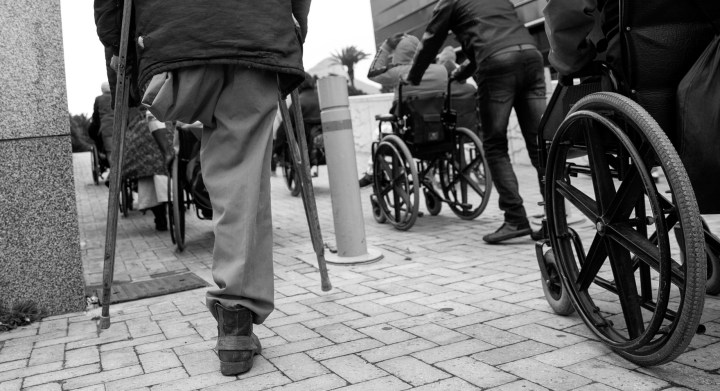OP-ED
Time to challenge our own prejudices about people with visible and invisible disabilities

One billion people, or 15% of the world’s population, live with some form of disability. Disappointingly, despite all the calls for inclusion, recognition of diversity, for more amplified voices through social media platforms and so on, there is deep-rooted ableism across societies, most of which is unrecognised by those exercising it.
‘There are none so blind as those who will not see. The most deluded people are those who choose to ignore what they already know,” the satirist Jonathan Swift wrote in 1738 in his Polite Conversation.
It’s an easy enough citation, given my own inability to see, but mine is a disability and not the turning of a blind eye, a practice well exercised as we at times delude ourselves into the idea of what has now in South Africa come to be termed “soft life”.
It was International Day of Persons with Disabilities on 3 December and, whether we know someone with a disability or not, it matters that we don’t afford ourselves the ignorance of “out of sight out of mind” and rather be anti-ableist.
As we reach the year’s end, many of us are looking forward to some rest.
South Africa’s hardships will unfortunately be with us even as we wind down to enjoy the festivities. So, lest we forget, even for a short while, let me implore you to not forget the world’s 15% and, among those, the ones whose condition is not “visible”.
One billion people, or 15% of the world’s population, live with some form of disability.
Ableism refers to discrimination in favour of able-bodied persons.
“Anti-ableism is the opposite of ableism, with a practical focus on strategies, theories, actions and practices that challenge, and counter, ableism, inequalities, prejudices and discrimination based on any type of disability — including visible, invisible, learning, developmental, physical or mental health,” according to Sheri Byrne-Haber, an American disability activist.
The International Day of Disabled Persons is observed annually and was proclaimed by UN General Assembly Resolution 47/3 in 1992, when I was in my first year of high school. It aims to promote the rights and wellbeing of persons with disabilities in all spheres of society, and to increase awareness of our situation across political, social, economic and cultural norms.
Having lived with a disability practically all my life, I’m endeavouring to inspire “polite conversation” or, preferably, vigorous conversation, to take place within the framework, political, social, economic and cultural aspects of disability, particularly the cultural, focusing on ableism.
Ableism, have you heard of it?
“Ableism is discrimination or prejudice against people who have disabilities,” according to the Urban Dictionary.
It is thought that ableism has evolutionary and existential origins (fear of contagion, fear of death). It may also be rooted in belief systems (social Darwinism, meritocracy), language (such as “suffering from” disability) or unconscious biases.
As we consider this subject, let us also be mindful of sanism.
In 2022, the theme for the International Day of Persons with Disabilities was “Not All Disabilities are Visible”. Some disabilities, like mental health disorders, chronic pain and fatigue, are invisible — but that does not make them any less devastating to a person’s quality of life.
Sanism, or mental ableism, is discrimination based on mental health conditions and cognitive disabilities.
Disappointingly, despite all the calls for inclusion and recognition of diversity, for more amplified voices through social media platforms etc, there is deep-rooted ableism across societies, most of which is unrecognised by those exercising it.
Cultural ableism is categorised as behavioural, cultural, attitudinal and social patterns that may discriminate against disabled people, including by denying, dismissing or invisibilising the disabled and by making accessibility and support unattainable.
Along the spectrum, there is hostile ableism, this when people become hostile against symptoms of disability or what are called phenotypes of the disabled person.
The Employment Equity Act 55 of 1998 strives to protect people with disabilities from social stigma and possible discrimination by allowing individuals the right not to disclose their disability, most certainly because of cultural practices such as sanism.
This prompted me to think I may very well be acquainted with, or even be friends with, someone with a mental or emotional disability — and so might you, though you don’t know it.
So naturally, much like ignorance of the law can’t protect you when you have broken it, ignorance can’t afford you the right to practice ableism.
On the other end of the spectrum there is internalised ableism, which is when a disabled person discriminates against themself and/or other disabled people by seeing the disability as something to be ashamed of, or something to be hidden, or by refusing accessibility or support from others.
Internal ableism was once my own story.
I experienced it on my path as a blind person while a student at the University of Cape Town and when I first entered the world of work. I was during this time completely allergic to my white cane, using it begrudgingly, and only when necessary. It is a kind of self-loathing, a rejection of a part of oneself.
It is purported, and this makes sense to me, that internalised ableism may be a result of mistreatment of disabled individuals, a form of gaslighting from society, but you’d likely have to have been in this kind of body to vouch for it.
Several other ableisms lie along the spectrum, for example structural ableism is failing to provide accessibility tools like ramps, wheelchairs and special education equipment.
These forms of ableism mentioned are not exhaustive. Discrimination against the disabled permeates all facets of society, manifests in various forms and has real and dire effects on children, adults and the elderly, across genders, across ethnicity and race.
Politics of disability
Turning to the landscape where disabled people can exercise power dynamics and relations with other groups, it must be said that considerable strides have been made in terms of policy, particularly as it relates to social construct and inclusion of disabled people.
In relation to the prevalence of disability in South Africa today, the Integrated Framework on Persons with Disability adopted in 2022 highlights a lack of reliable information on the nature and prevalence of disability.
This is because disability issues were once viewed in a medical framework. As a result, there was failure to integrate disability into mainstream government statistical processes.
On a more empowering trajectory, the World Bank Global Surveys on Disability and Inclusion indicate that global awareness of disability-inclusive development is increasing.
The UN Convention on the Rights of Persons with Disabilities (CRPD) promotes full integration into societies. The CRPD specifically references the importance of international development in addressing the rights of persons with disabilities.
South Africa’s National Development Plan (NDP) 2030 makes multiple references, throughout the 13 chapters, to the inclusion of persons with disability as well as people with mental illness, to ensure we are considered in all aspects of long-term planning, from socioeconomic, developmental, national interest and social cohesion perspectives.
The 2030 Agenda for Sustainable Development, the Sustainable Development Goals (SDGs), states that disability cannot be a reason or criterion for lack of access to development programming and the realisation of human rights. The SDGs framework includes seven targets that explicitly refer to persons with disabilities, and six additional targets for persons in vulnerable situations, which include persons with mental disorders.
Diversity inclusion and integration is seemingly gaining more traction over time.
To ensure we are making real strides in the reduction and possible elimination of ableism and disablism, we need to strengthen monitoring and evaluation of implementation of social programmes aimed at creating inclusive and conducive conditions for people with visible and non-visible conditions.
So, as you disabuse your children of the notion of Father Christmas, or contemplate resolutions for the next year, be mindful about being anti-ableist. It’s like being anti-racism or anti-sexism and makes for a soft landing. DM/MC
Makhiba Mollo is a commissioner on the National Planning Commission.

















Comments - Please login in order to comment.